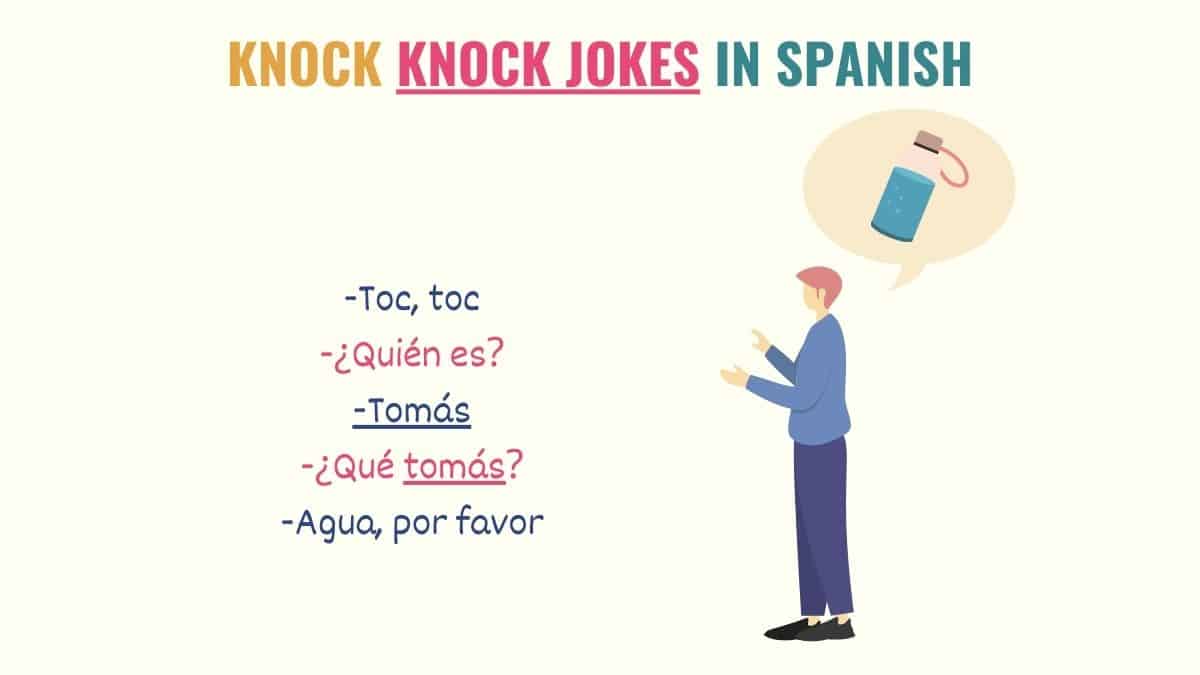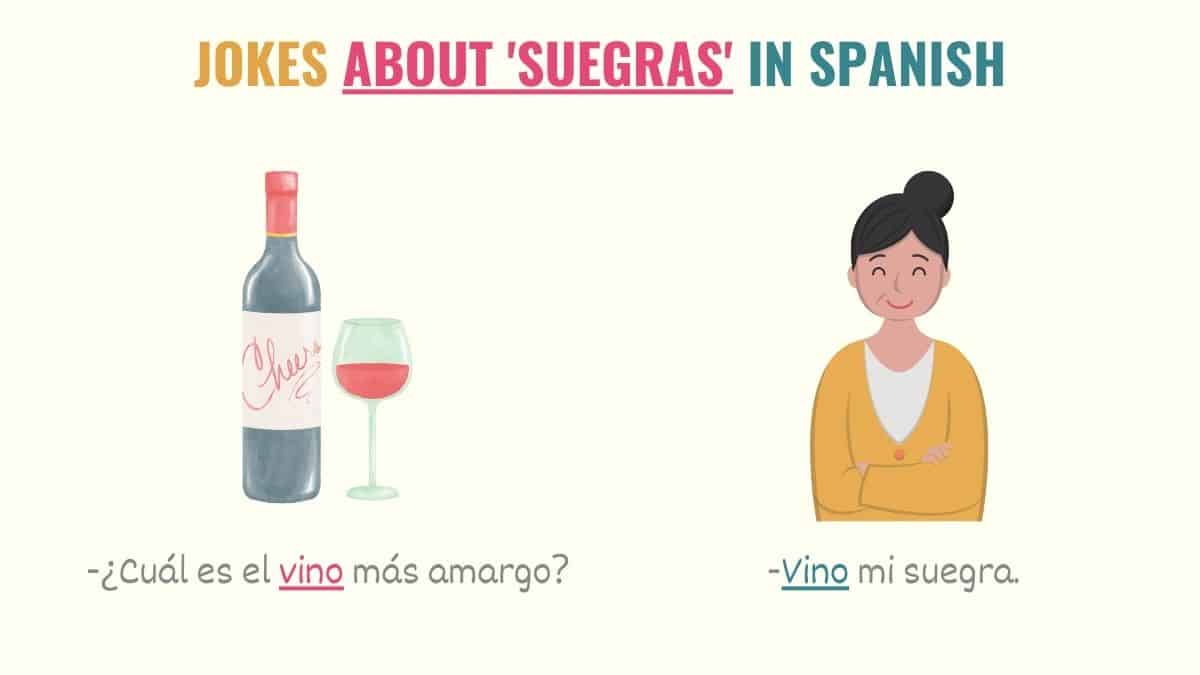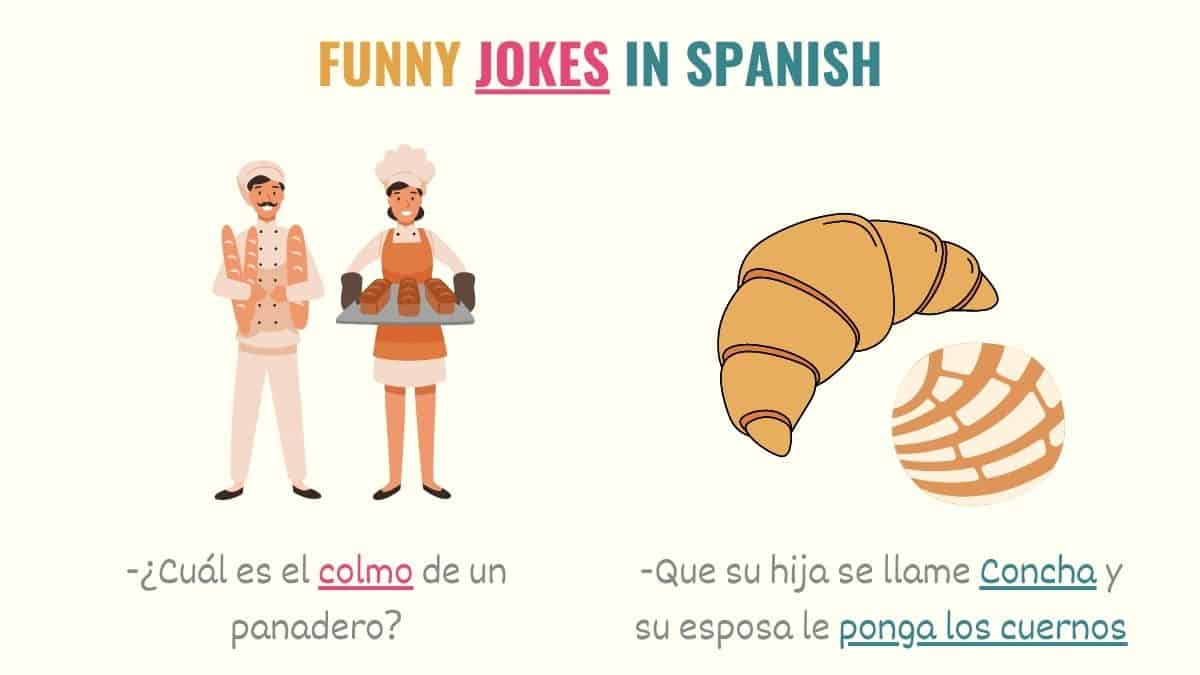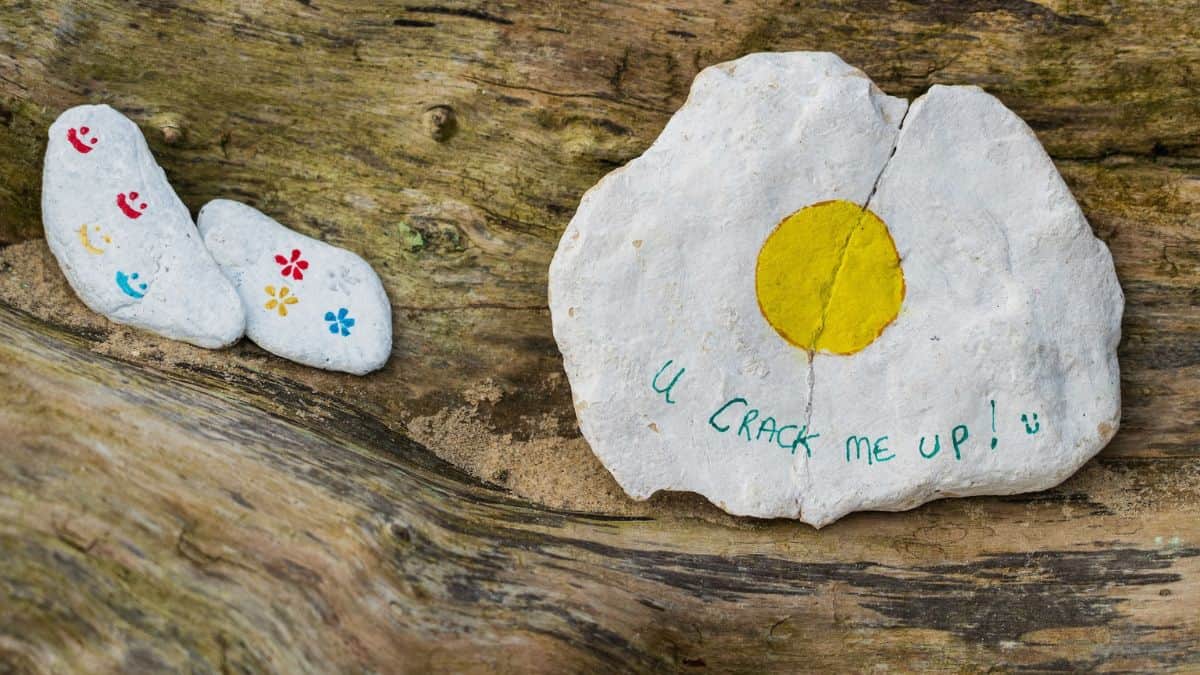Yes, we all know that jokes are an excellent way to make people laugh. But not many people know that jokes in Spanish are also a great learning resource. Leaving aside how funny they can be, jokes are packed with simple, but clever vocabulary and language structures.
But don’t take my word for it, here are some reasons why jokes in Spanish can be helpful for you:
- They provide you with new vocabulary and idioms.
- You practice and improve your reading, listening, and comprehension skills.
- They help you identify similar sounding words with different meanings.
- You improve your storytelling skills.
- You get to practice simple grammar structures and basic spelling.
- They help you practice different tenses in Spanish.
Hands down, to understand jokes in Spanish you must have a decent command of the language. In simple words, understanding jokes is a strong indicator that you have a good grasp of Spanish.
Seeing how important jokes can be for your learning process, in this article, you’ll find:
- Knock Knock Jokes
- Mother-In-Law Jokes in Spanish
- Mexican Jokes
- Jokes About Food
- More Funny Spanish Jokes
Learning Tip: Choose a couple of jokes in Spanish and practice them! Just like if you were going to tell them to your friends. Pay attention to your pronunciation, intonation, and the vocabulary.
Knock Knock Jokes in Spanish
Knock knock jokes in Spanish are not very popular. But here you have a few so you can start warming up.
1. Argentinian word play
– Toc, toc
– ¿Quién es?
– Tomás
– ¿Qué tomás?
– Agua, por favor.
Are you able to see the pun in this Spanish joke? Let me help you. In Argentina, the conjugation of ‘tomar’ for the second person (tú/vos) is ‘vos tomás’, which sounds exactly like the name ‘Tomás’. So, this joke is playing with the meaning of both words.

2. A warm welcoming
– Toc, toc.
– ¿Quién es?
– Lola
-¿Qué Lola?
-Lo ladrones
– Espera que estoy con lame.
-¿Lame que?
– La ametralladora.
Spanish is one of the fastest spoken languages. Because of this speed, it’s common that certain sounds merge together. The thieves (ladrones) in this joke use this effect to try to fool the other person. Lola is a nickname, but it’s also the merge of los ladrones. The follow up uses the same effect La ametralladora (machine gun).
3. How many times must I repeat myself?
– Toc, toc
– ¿Quién es?
– Abraham.
– No hasta que me digas quién eres.
– ¡Abraham!
– Lo siento, pero no te abro si no me dices tu nombre.
– Soy ¡ABRAHAAAAAM!
– Aaaaah, debiste comenzar por allí.
Like many knock knock jokes in Spanish, this short joke is based on a play on words. Because our ‘h’ is mute, the name Abraham can sound quite similar to the Spanish command ¡abran! (open).
Take Note: In English, knock-knock is the sound you make when knocking at someone’s door. Its Spanish equivalent is toc-toc.
Mother-In-Law Jokes in Spanish
One common cliché in the Hispanic culture is that mother-in-laws (suegras) are awful. Because of this, many jokes in Spanish are about them! Here are some examples of this type of jokes:
4. A bitter wine…
– ¿Cuál es el vino más amargo?
– Vino mi suegra.

In Spanish, vino refers to ‘wine’, but it’s also the preterite form of the verb ‘venir’. This allows people to play with the meaning of the two words. So, when someone asks which is the most bitter wine (vino), you can say vino mi suegra (my mother-in-law came).
5. Go toward the light!
Una suegra se está muriendo en el hospital, mira por la ventana y dice:
– Qué bonito atardecer.
A lo que el yerno le contesta:
– No se distraiga suegra, concéntrese en mirar el túnel.
6. You can’t win with your mother-in-law
– ¿Qué diferencia hay entre una suegra y un terrorista?
– Que con el terrorista se puede negociar.
7. Twinkle twinkle little suegra!
– A mí me gustaría que mi suegra fuera una estrella.
– ¿Sí? ¿Para que los lleve a Hollywood?
– No, para que estuviera a 3.000 años luz.
8. If the house was on fire…
– ¡AUXILIO, socorro, llamen a los bomberos… se quema nuestra casa!
– ¡Shhh! Silencio amor, no hagas ruido que vas a despertar a tu mamá.
Take Note: ‘Joke’ in Spanish can be translated as chiste or broma. ‘Chiste’ is a short story with a funny ending (just like the ones in this article). ‘Broma’, on the other hand, refers to pulling a prank on a friend.
Mexican Jokes
Usually, Mexican jokes revolve around showing Mexican ingenuity and other stereotypical traits. Below you can find some of these jokes:
9. A Frenchman and a Mexican guide on a safari…
Un francés se fue a un safari y contrató a un guía mexicano. En plena selva apareció un tigre, el mexicano corrió y el francés gritó:
– ¡Esperra, esperra!
Y el mexicano le responde:
– No, no es perra. ¡Es tigre!
I’ll give you a hand with this one. French people speaking Spanish tend to pronounce the letter ‘r’ really hard. This is what this Spanish pun is intending to express. Esperra would be the way a French person pronounces ‘espera’ (wait), in which case the Mexican says “it’s not a dog, it’s a tiger (no es perra, ¡es tigre!).
10. Three whips from the devil.
Estaban un mexicano, un estadounidense y un hindú en el infierno. El diablo les dice:
– Bueno, les daré una oportunidad. Quien aguante tres latigazos míos se puede ir al cielo. Para darles chance, pueden ponerse lo que quieran en la espalda.
Pasa el estadounidense y dice:
– A mí ponerme placa de plomo americano de 10 cm.
Y le dan uno, dos y el estadounidense grita:
– ¡Ah, no ya basta!
– Ni modo, te quedas en el infierno.
Llega el hindú y el diablo le pregunta
– ¿Qué te ponemos en la espalda?
Y el hindú contesta:
– A mí no me pongan nada.
El diablo se saca de onda.
Y el hindú se pone a meditar.
1,2,3…10 latigazos y el hindú como si nada.
Y lo dejan ir al cielo.
Entra el mexicano y el diablo le pregunta:
– ¿Qué quieres que te ponga en la espalda?
Y contesta el mexicano:
– No, pues ponme al hindú que pasó ahorita.
11. A Chinese, French and Mexican in a plane.
Iban en un avión un chino, un francés y un mexicano. Dice el francés:
– Ya llegamos a Francia.
– ¿Por qué?
– Porque ahí está la Torre Eiffel.
Luego dice el chino:
– Ya llegamos a China.
– ¿Por qué?
– Porque ahí está la Muralla China.
Y al ultimo dice el mexicano:
– Ya llegamos a México.
– ¿Por qué?
– Porque ya me robaron la cartera.
Take Note: Here is a little tip if you want to sound more natural when speaking Spanish. When talking about personal effects or body parts, you can use definite articles to express possession instead of possessive adjectives. You can see this structure in joke #10.
Jokes in Spanish About Food
These types of Spanish jokes are usually about creating puns and playing with the sounds of two or more words. Even though they look simple, these jokes actually require some command of Spanish.
Because of their characteristics, these Spanish jokes cannot be translated. If you did, they wouldn’t be funny at all. So, take your time to try to understand them.
12. What do you call a country that bans tacos?
– ¿En qué se convierte un país en el que se prohíben los tacos?
– ¿En qué?
– ¡En un país destacado!
The Spanish prefix des conveys the opposite idea of a word. For example, construir (to build) and destruir (to destroy). This Mexican joke uses this idea when saying that a country banning tacos would be a “tacoless” place. However, destacado actually means ‘prominent’, which adds a meaner layer to the joke.
13. Part of the job!
– ¿Cuál es el colmo de un panadero?
– Que su hija se llame Concha y su esposa le ponga los cuernos.
14. (Not so) hot tamale
– ¿Por qué se fue el tamal al hospital?
– Porque ta’ malito.
15. Excuse me, waiter!
– ¡Mesero, mesero! Esté filete está blando.
– ¿Sí? Pues dígale que se calle.
In Spanish, ‘blando’ means ‘soft or ‘tender’, but when you say ‘está blando’ quickly, it sounds like ‘hablando’, the gerund form for ‘hablar’ (to talk). So the waiter tells you to tell the filet to shut up!
16. How do you make bread talk?
– ¿Cómo haces para que un pan hable?
– Lo pones en agua toda la noche y al día siguiente ya está blando.
17. The richest animal
– ¿Cuál es el animal más rico?
– El borrego porque tiene lana.
Take Note: While the formal term for money is ‘dinero’, in Spanish, ‘lana’ is a slang term we use for money. ‘Rico’ can be translated as rich or delicious. So this joke is a play on two words.
18. She’s full!
– ¿Por qué la ballena no come?
– Porque ba-llena.
19. Would that be me?
– ¿Qué dijo una cereza cuando se vio al espejo?
– ¿Cereza yo?
As mentioned before, many words in Spanish seem to merge with each other when speaking at a native speaker speed. This joke plays with that concept. Cereza (cherry) sounds exactly the same as ‘¿seré esa?’ (would that be me?), which is the little cherry’s question when seeing herself in the mirror.
More Funny Spanish Jokes
20. “Dirty hair” in Mandarin.
– ¿Cómo se dice pelo sucio en chino?
– Chin cham pu.
21. Attempting to teach Spanish tenses.
La maestra le pregunta a Pepito:
– A ver Pepito, si yo digo: “fui rica”, es pasado. Pero si yo digo: “soy hermosa”, ¿qué es?
– ¡Exceso de imaginación profesora!
‘Pepito’ is a famous caricature that we use in Spanish jokes. As you’ll see, this boy can be quite cheeky and always has the best comebacks.
22. Pepito learns faster!
– Pepito, conjuga el verbo andar.
– Yo…Yo ando. Tú…tú andas.
– ¡Más rápido!
– Él corre, nosotros corremos, ellos corren.
23. A thief’s name
– ¿Cuál es el colmo de un ladrón?
– Llamarse Esteban Dido.
24. Another size, please
– Buenos días, quería una camiseta de un personaje inspirador.
– ¿Gandhi?
– No, mediani.
25. Bad career choice
– ¿Cuál es el colmo de un electricista?
– Que su mujer se llame Luz y los hijos le sigan la corriente.
Take Note: El colmo is a popular expression in Spanish. In most contexts, we use it to express that something is ‘too much’ or in ‘the limit’. However, when it comes to jokes in Spanish, el colmo is close in meaning to ‘the irony’.
26. Accent marks in action
– ¿Qué diferencia hay entre “Lástima” y “Lastima”?
– El tamaño.
Many learners wonder if accent marks in Spanish are important. Heck, yes! They are crucial as you can see in this joke. Lástima with an accent means ‘pity’ or ‘shame’. However, lastima (no accent) means ‘it hurts’. So, if someone says that el tamaño (the size) is the difference between ‘lástima’ and ‘lastima’…well, you get the point.

Wrapping Up
Do not take jokes in Spanish for granted! They are actually good for your learning! If you read or listen to some jokes every day, you will actively improve your Spanish comprehension in multiple aspects and different levels.
Give these a shot and try to incorporate them into your Spanish conversations!



